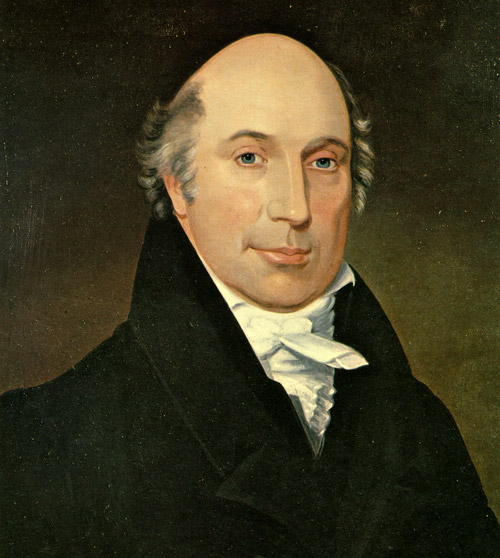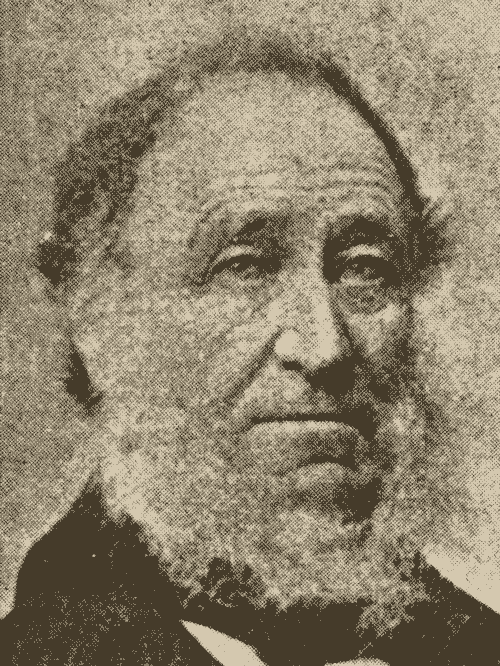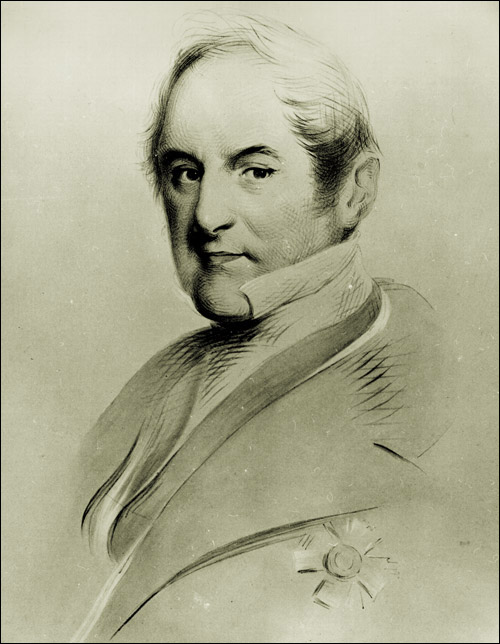tension between the colonists and the british government grew mainly due to what issue?
Representative Regime, 1832-1855
In the mid-1820s, the system of naval authorities which had evolved during the 18th century was replaced by the constitutional arrangements usual for a Crown colony. The governor, appointed by the British government, administered the colony with a number of appointed officials, collectively known every bit the Executive Council. They operated inside a legal framework established by the British Parliament, but specific local regulations were ready by the governor, and customary law was oftentimes determined and applied by the courts. There was no legislature.
In the aftermath of the Napoleonic wars, the population of Newfoundland grew to a betoken where some residents felt that they should exist able to elect representatives to a legislature which would brand local laws. Recent immigrants, such as Patrick Morris, from Ireland, and William Carson, from Scotland, campaigned for representative government - the organisation in place elsewhere in British North America.

William Carson (1770-1843), north.d.
Carson, a 19th century Newfoundland reformer and politician, campaigned for representative authorities.
Creative person unknown. Courtesy of The Rooms Provincial Athenaeum Segmentation (A 23-91), St. John's, NL
Morris and Carson blamed many of Newfoundland'south bug upon a "despotic" British assistants and argued that representative institutions would assistance bring virtually greater prosperity. They were right to point out that Newfoundland deserved representative government, but they also had personal ambitions. At the same fourth dimension, many of the merchants who dominated the local economy opposed the granting of representative authorities, arguing that the price of a legislature would accept to be born by taxes - which would raise the cost of producing fish and injure business concern. Other merchants supported representative government, if just considering a local legislature could prevent the government from raising taxes for a project that did not benefit the fishery.
The beak to grant representative government to Newfoundland came before the British Parliament in 1832, the same yr that the right to vote was extended to many British citizens and the Firm of Commons was reformed. In the spirit of reform, the Whig regime saw the cosmos of a Newfoundland legislature as something which would benefit the colony, and reduce British expenditures there. Later on an election held in the fall of 1832, the new system came into performance the following year.
Equally in other British North American colonies, the legislature consisted of an elected Assembly, and an appointed Legislative Quango which consisted of government appointees, part holders (such as the Colonial Treasurer and the Chief Justice) and military officers. The Legislative and Executive councils were largely equanimous of the same group of people. Together with the governor, they were, in fact, "the authorities". However, the elected Assembly, with 15 seats representing x districts, could exert some power because its assent to legislation was essential, including measures dealing with the colony'south finances. Almost all men were given the correct to vote and stand for election. Notation that women could not vote, nor sit in the legislature, until the 1920s.
In theory, this colonial version of the "British constitution" had the checks and balances that British reformers believed would result in beneficial legislation. Just it did not work well in any of the British North American colonies. Elected Assembly members inevitably wanted more ability, and thought they were the real government since they represented the people. Members of the Councils feared "mob rule", resisted whatsoever loss of power, and blocked measures which might hurt the interests of their grade.
Political Divisions and Tensions
The nature of Newfoundland social club raised questions about the practicality of this course of authorities. The colony did non take a land-holding gentry class, or much of a middle class - the educated and financially independent groups which dominated the reformed Business firm of Commons in Uk, and whose members were assumed to have the best interests of the country in mind. In Newfoundland, about men were either fishermen or fish merchants. The former were often illiterate or badly-educated and, in the view of the Colonial Part, not suitable to play a role in authorities. The latter were often short-term residents, tending to return to Britain when they had made or lost their coin, and it could non be assumed that they would support public works and services that required taxes to exist raised.
Given the divisions inside Newfoundland society and the nature of the constitution, sharp differences presently appeared between the Council and the Assembly, every bit was the instance in other colonies. These difficulties were exacerbated by the fact that members of the Quango were near always members of the Church of England, while the Assembly included significant numbers of Roman Catholics, Methodists, and members of other dissenting churches. The command of ability and patronage past Anglicans was much resented past other denominations. This was especially the instance among the Irish gaelic Roman Catholics, many of them contempo immigrants, to whom the Irish struggle against the British regime for Catholic emancipation (granted in 1829) nevertheless seemed relevant. Organized religion and ethnicity were factors as important equally class in the Newfoundland politics of this catamenia.
The Roman Catholic bishop, Michael Fleming, was himself an immigrant from Ireland, and pursued an "Irish nationalistic" calendar. He saw himself equally the leader of the Irish gaelic customs and was not shy most taking on the local British establishment, much as his friend and countryman Daniel O'Connell was doing at home, peculiarly since he felt threatened by the Church of England'south attempts to counteract growing Cosmic influence.
While some "Tories" - supporters of the governor and council - were elected to the Assembly, it speedily became dominated by "Reformers" or "Liberals" (mostly Roman Cosmic or Methodist), who wanted to gain greater ability and influence. For the first few years, Reformers fought with the council for control over spending and authorities appointments. The struggle spilled over into inflammatory newspaper editorials, and lawsuits between increasingly bitter rivals. Tensions were fabricated worse by the actions of partisans on both sides of the divide. Bishop Fleming intervened to get particular men elected, raising in the Tory minds the specter of a "priests' party" dominating the Assembly. Protestant newspaper editor Henry Winton engaged in a campaign against priests' influence in politics, and Chief Justice Henry Boulton was aggressive in his active partisanship against the Reformers.

Chief Justice Henry Boulton (1790-1870), n.d.
Boulton was not a supporter of the Reform party.
From D.W. Prowse, A History of Newfoundland, from the English, Colonial, and Foreign Records (London: Macmillan, 1895) 434.
Politics was tumultuous both outside and inside the legislature. Since in that location was no secret ballot, voters had to stand and be counted at polling stations - providing fine opportunities for violence and intimidation. On several occasions, troops intervened when angry crowds confronted each other during elections. In a famous incident in 1835, Winton was assaulted past masked men and had his ears mutilated every bit retaliation for his paper's campaign. The Associates's sessions were dominated by questions of privilege, and on a couple of farthermost occasions the Reformers attempted to imprison those who did not accept the Associates'due south authority. Oft, the Legislative Council refused to approve bills that encroached upon its prerogatives, or the governor declined to sign them. But despite the tumult, some useful legislation was enacted, and exterior political circles most people carried on with their lives as usual.
An try to bridge the many divisions in Newfoundland society and public life was made by the Newfoundland Natives' Society, founded in 1840. The society wanted to accelerate the careers and interests of native-built-in Newfoundlanders, no matter what their indigenous origin or religious affiliation. Newfoundland-built-in Roman Catholics who opposed Fleming's influence were able to work with Protestant reformers. This marked the arrival of a new phenomenon, Newfoundland nationalism. From this signal on information technology was possible, although not e'er like shooting fish in a barrel, to unite Newfoundlanders by ways a nationalist appeal. It was a small motility but a significant development.
Disillusion and the Amalgamated Legislature
By 1836, Protestant merchants and their Government Business firm allies had come to understand that they would not be able to control the Assembly, which would e'er have a Reform majority. As consequence, most merchants decided not to run for election, gave upward on politics and left information technology to the Legislative Council to block measures which would be to their disadvantage. Many merchants had opposed local government from the offset. The ability and activities of the Liberals, and the growth in government spending, seemed to confirm their worst fears.
The Colonial Office was not disposed to abolish representative authorities, but began to consider ways to end the constant warfare between the elected Assembly and the appointed Council. Between 1842 and 1848, therefore, the Colonial Function tried a new experiment in representative government - an Amalgamated Assembly. The Associates and Quango were merged, with some elected members sitting in the same chamber with a number of appointed members. The two groups had to piece of work together, but it did not join them together in any common crusade; and since the experiment was temporary, there was only a brief suspension from the political fighting that had made the starting time ten years of representative government and so hard.
Moreover, one of reasons the amalgamated system worked was the political skill displayed by a new governor, Sir John Harvey. After his term ended, the re-emergence of political party politics made governance very difficult for his successor, peculiarly because attending was now turning to the new concept of responsible government. This reformulation of colonial government derived from problems experienced elsewhere in British North America. It was close to actual do in Britain, and remains the footing of the constitution that exists today. The fundamental requirement was that the Executive Council - which we call the cabinet - had to be drawn from members of the political political party holding the most seats in the Associates. The leader of that party became the premier.

Sir John Harvey (1778-1852), n.d.
Harvey, governor of Newfoundland from 1841-1846, was partly responsible for the revised constitution which confederate the two houses of the legislature.
Creative person unknown. Courtesy of The Rooms Provincial Archives Division (VA 27-39a), St. John'due south, NL.
The campaign for responsible authorities in Newfoundland was started by a coalition of Reformers - both Roman Catholic and Methodist - and some of the native-born. They felt that Newfoundland should enjoy the aforementioned constitutional condition as other colonies, which began to receive responsible government in the late 1840s, and that elected Newfoundlanders rather than Crown appointees should ready government policy. They were opposed by the Tories and their allies, all of them Protestant, who feared both loss of office and a Reform/Liberal government dominated by Roman Catholics led by their bishop.
These tensions came into the open up once the amalgamated system expired in 1848 and the former constitution was restored. There were other, difficult and bitter disputes over patronage and the management of the denominational schoolhouse system which further divided the Anglican community from Roman Catholics and Methodists. But after years of antagonistic rhetoric, rival deputations to London and legislative deadlock, the British regime decided in 1854 that there was no defensible reason why Newfoundland should non take responsible regime, given that it had been instituted elsewhere in British North America. There were doubts in London, and a mixed reaction in the colony. The system was to last until 1934.
Version française
Source: https://www.heritage.nf.ca/articles/politics/representative-government-1832-to-1855.php